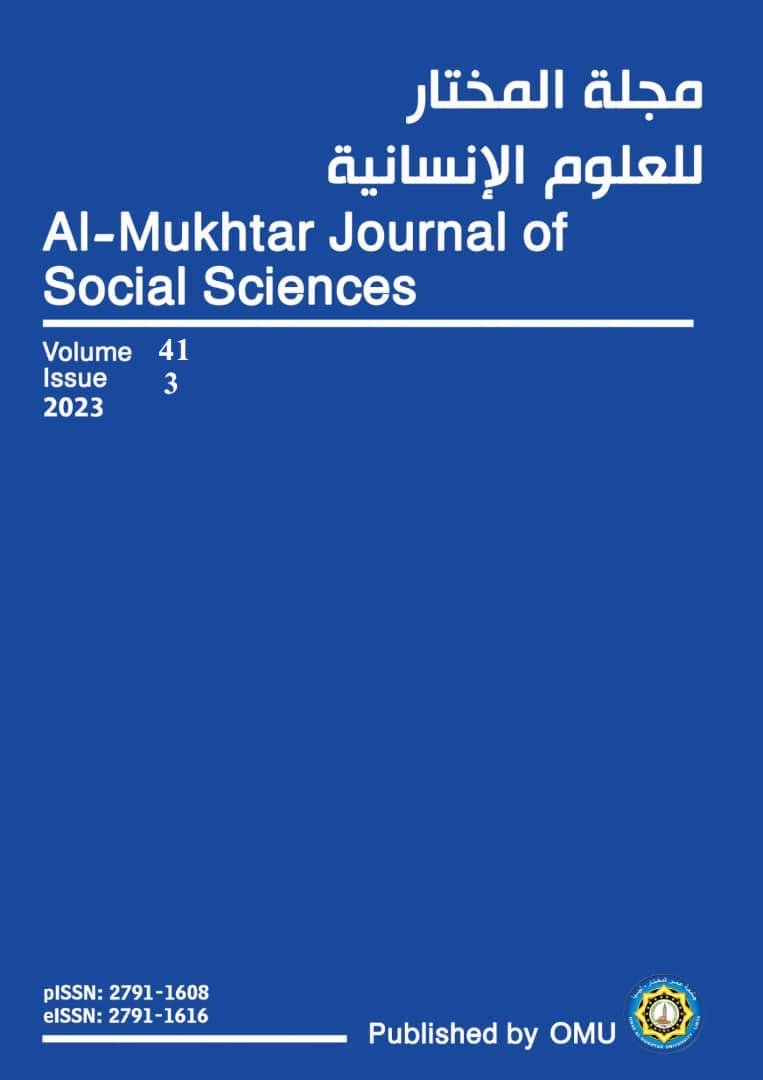صيغ الأمر ودلالاتها في ديوان البيان: للشاعر محمد مصطفى صوفية
DOI:
https://doi.org/10.54172/jn31mn76الكلمات المفتاحية:
صيغ الأمر، دلالتها، الفعل اللازم، الفعل المتعدي، أسماء الأفعالالملخص
إن المتأمل في الشعر العربي يجد أن الشاعر محمد صوفية واحد من شعراء العربية المعاصرين؛ فقد كان له دور كبير في نشر الأدب العربي عامة، والأدب الليبي خاصة؛ فقد استطاع أن ينتج شعراً تميز بجودة المعاني، وسهولة الألفاظ، وهو جدير بالدراسة مما جعلني أرغب في دراسة شعره فاخترت عنوان البحث: (صيغ الأمر ودلالاتها في ديوان البيان للشاعر محمد مصطفى صوفية)؛ وذلك للتعرف على صيغ الأمر المستعملة، ودلالاتها المختلفة، واستخدمت في هذه الدراسة المنهج التحليلي القائم على تحليل الأبيات تحليلاً دقيقاً، للوصول إلى المعاني التي قصدها الشاعر، وخلصت الدراسة إلى نتائج منها:- أن الشاعر وافق جمهور النحاة في استعماله لصيغ الأمر بجميع أنواعها، وأنه وظف صيغ الأمر لأغراض دلالية مختلفة بحسب المقام الذي وردت فيه، فجاءت الصيغة تارة للمدح، والثناء، وتارة للتوبيخ، وأخرى للدعاء، وغير ذلك من الأعراض الدلالية، وبهذا يتبين لي أن الشاعر قد استعمل اللغة فيما يوافق جمهور النحاة، والبلاغة، وكان حريصاً على اختيار الألفاظ المناسبة متحرياً الإيجاز مبتعداً عن الألفاظ الغريبة والوحشية.
التنزيلات
منشور
إصدار
القسم
الرخصة
الحقوق الفكرية (c) 2023 عبد الحميد محمد حمدان (Author)

هذا العمل مرخص بموجب Creative Commons Attribution 4.0 International License.
جميع المقالات المنشورة في مجلة المختار للعلوم الانسانية تقع تحت رخصة Creative Commons Attribution 4.0 International License.. ويحتفظ المؤلف (المؤلفون) بحقوق النشر للمقالات التي نشرتها مجلة المختار للعلوم الانسانية مع ضمانهم بمنح أي طرف ثالث الحق في استخدام المقالة بحرية طالما تم الحفاظ على محتوياتها ومؤلفيها الأصليين والاستشهاد بالمصدر الأصلي للنشر، كم أنهم يقبلون ببقاء المقالة منشورة على موقع المجلة (إلا في حالة سحب المقال).














